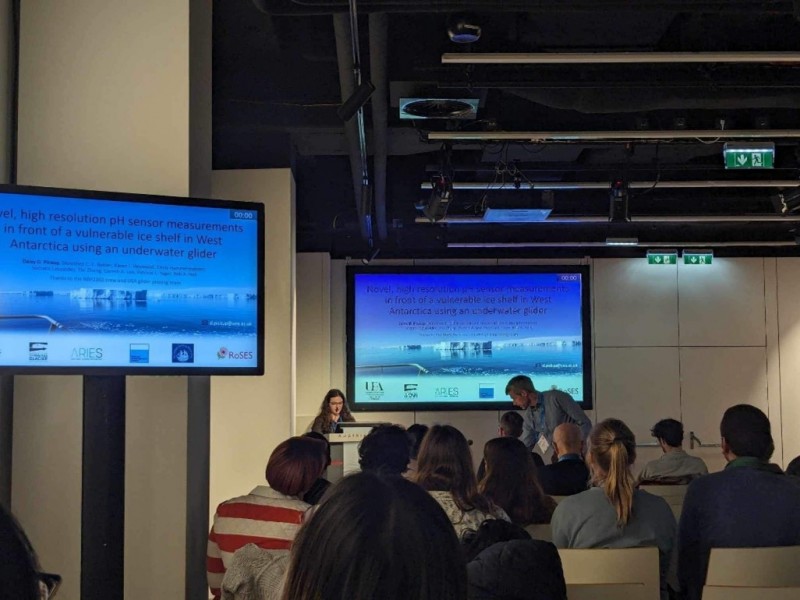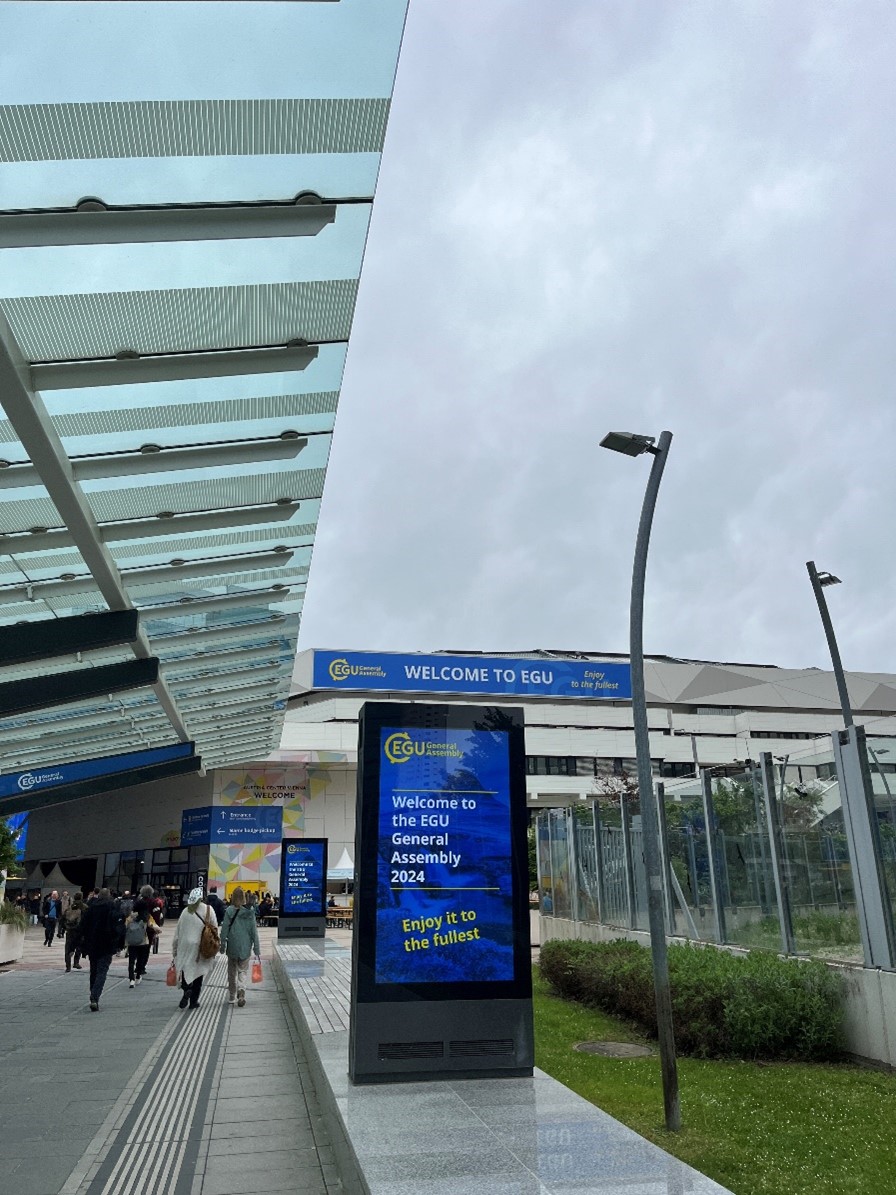Attending EGU24
Daisy Pickup
University of East Anglia

Despite being in the final year of my PhD, this was my first time attending an international conference. In addition, I was also going to present my first in person oral presentation. The journey began in an exciting way as I had decided to take the train. Covering approximately 920 miles, it took 22 hours of travel door to door, passing through France, Belgium and Germany before arriving in Vienna.

The first day of the conference was not as overwhelming as I expected. Despite the huge venue and countless number of rooms, everything was well signposted and labelled. The first couple of days held sessions not overly relevant to my research, so I took the advice of my colleagues to attend sessions that piqued my general interest, regardless of relevance to my own PhD. This allowed me to soak up information surrounding extreme marine events and how we can improve weather forecasting.
Further in the week I was inundated with interesting science surrounding biogeochemistry in the Southern Ocean and beyond. On Wednesday afternoon I was excited to present my own PhD research, and whilst it was daunting, it was something I was really glad to have done and experienced. Not only was it valuable for me to present my own work, it was rewarding to attend talks by my peers and colleagues and see the outcomes of their hard work as well.
One of my favourite parts of the conference was the poster sessions. They led to many stimulating conversations and could be a nice break after a day of talks. Another highlight was the banana bread sold by the conference café which I discovered on the first day and subsequently had a slice of every day after…
Ultimately the whole experience was completely enriching. I have left EGU feeling like I am more involved in the scientific research community. It was a very rewarding week that not only enhanced my learning, but also allowed me to gain different perspectives. It was really nice to take a break from thesis writing to remind myself of the bigger picture and where my research fits in the wider scientific community. I am very grateful to the Challenger Society for the travel award that enabled my attendance.
Profile
I am a final year PhD student at the University of East Anglia studying pH variations in the coastal Amundsen Sea, West Antarctica, under the supervision of Dorothee Bakker and Karen Heywood. As part of my research project, I was fortunate to partake in a research expedition to the Amundsen Sea where I measured pH using two novel sensors. Monitoring changes to pH, and the carbonate system as a whole, is important in the global ocean. Furthermore, the polar oceans are significantly susceptible to anthropogenic effects as they take up approximately a quarter of all anthropogenic carbon dioxide. I aim to investigate the drivers that cause pH variation in this region during the late austral summer, in front of a rapidly melting ice shelf, and the consequences this may have for the wider carbonate chemistry system.
Latest News
Marine Data Management, Governance and the MEDIN toolset
The Marine Environmental Data and Information Network (MEDIN) and OceanWise are delighted to invite you to attend our popular free online training workshop: ‘Marine Data Management, Governance and the MEDIN toolset’ on the 19th – 23rd of May 2025.
Workshop on the contribution of UK Arctic Ocean science to the International Polar Year 32/33
12:00 11th June – 16:00 12th June 2025: NOC Southampton (In-person with online option): Registration deadline 16th May
REGISTER HERE
Pre-meeting questionnaire (open to all)
The purpose of this workshop is for the UK Ocean Science community to discuss and then draft a prospectus document outlining the priority Arctic research questions the community would like to address during the run up to, throughout and beyond the International Polar Year 32/33. Additionally, to identify what unique strengths and technologies the UK has to help fill these knowledge gaps.
The second day of the workshop will be dedicated to writing groups, one for each of the priority research questions identified - from both the pre-meeting questionnaire (HERE) and day one discussion. By the end of the meeting, each group will have produced draft text and sourced supporting figures for the prospectus.
Post meeting, the draft will be opened for comments and suggestions from everyone, regardless of whether they were able to attend the workshop or not. It will then be shared with UK funders (UKRI, FCDO, DSIT, ARIA) and potential international programmes with whom we would like to collaborate (e.g. Arctic 2050, Norway). It will form a basis from which wider integration with terrestrial, atmospheric and cryosphere communities can be built, e.g. at the UK Arctic Science Meeting in September in Northumbria.
To ensure balanced community and ECR representation, and to ensure that the size of the writing groups is efficient and effective, if the number of registrations from individual institutes becomes overwhelming, we may contact individuals or teams and ask that each institute selects a smaller number of individuals to attend in-person. Please wait for confirmation of in-person attendance before finalising travel arrangements.
The workshop will be open to hybrid attendance and contributions on both days.
Challenger Society Council Position Vacancy
The Challenger Society for Marine Science (CSMS) are pleased to announce an exciting opportunity to support the next generation of ocean scientists and innovators. CSMS are looking for a new Council member to fill the Student Travel Awards and Stepping Stones Portfolio. The successful applicant will administer the travel and research grants available for Early Career Researchers.
The role involves:
- Receiving applications for the two schemes and responding to applicant inquiries
- Soliciting and compiling input from the rest of the Council for assessing the applications
- Communicating with successful and unsuccessful applicants for the two schemes
- Working with the Honorary Treasurer on allocating funds to successful applicants
- Following up with award winners on their reporting requirements
- Attending Council meetings four times a year (in person or online) and contributing to discussions and decision making for CSMS
The usual term for Council members is three years.
For more information about the CSMS Council, please follow this link: https://www.challenger-society.org.uk/The_Council
For more information about our Early Career Researcher grants and awards, please follow this link:
https://www.challenger-society.org.uk/Stepping_Stones
and
https://www.challenger-society.org.uk/Travel_awards
If you are interested in applying or have any questions regarding the role, please contact kathen@bas.ac.uk
